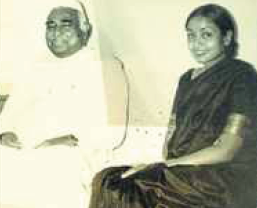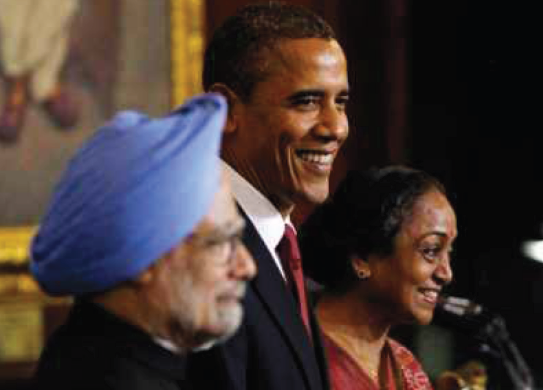Meira Kumar
(→Essential facts) |
|||
| Line 13: | Line 13: | ||
=Essential facts= | =Essential facts= | ||
| + | Kumar is married to lawyer, Manjul Kumar | ||
| + | |||
| + | Devangana, daughter, is an artist | ||
| + | |||
| + | |||
[http://timesofindia.indiatimes.com/india/meira-kumar-all-you-want-to-know-about-oppns-presidential-nominee/articleshow/59271759.cms Meira Kumar: All you want to know about oppn's presidential nominee| Jun 22, 2017 | IndiaTimes/ ''The Times of India''] | [http://timesofindia.indiatimes.com/india/meira-kumar-all-you-want-to-know-about-oppns-presidential-nominee/articleshow/59271759.cms Meira Kumar: All you want to know about oppn's presidential nominee| Jun 22, 2017 | IndiaTimes/ ''The Times of India''] | ||
| Line 45: | Line 50: | ||
From 2009 to 2014, Kumar served as Lok Sabha Speaker, thereby becoming the first woman speaker of the country. | From 2009 to 2014, Kumar served as Lok Sabha Speaker, thereby becoming the first woman speaker of the country. | ||
| − | |||
| − | |||
=India's first woman speaker= | =India's first woman speaker= | ||
Revision as of 23:17, 22 June 2017
This is a collection of articles archived for the excellence of their content. |
Contents |
Essential facts
Kumar is married to lawyer, Manjul Kumar
Devangana, daughter, is an artist
HIGHLIGHTS
Congress-led opposition parties in 2017 picked former Lok Sabha speaker Meira Kumar as their candidate for country's next president.
Here's all you want to know about her:
PERSONAL LIFE
Meira Kumar, born in Bihar's Arrah district, is the daughter of prominent Dalit leader and former deputy prime minister Jagjivan Ram, and freedom fighter, Indrani Devi.
EDUCATION
Kumar is a law graduate and holds a Master's degree in English literature. In 1973, she qualified Indian Foreign Services and served at embassies in Mauritius, Spain and United Kingdom. She can also speak Spanish.
POLITICS
After quitting from foreign services in 1985, she decided to peruse her career in politics. In her first contest from Uttar Pradesh's Bijnor, Kumar defeated political heavyweights such as Ram Vilas Paswan and Mayawati. Both Vilas and Mayawati are also dalit leaders.
LOK SABHA
Kumar was member of the eighth, eleventh and twelfth Lok Sabhas from Karol Bagh in Delhi. Though she lost her seat in 1999, but eventually got re-elected from her father's former constituency of Bihar's Sasaram in 2004 and 2009.
'TWO TIME UNION MINISTER'
In 2004, Kumar was appointed as Minister of Social Justice and Empowerment under the leadership of then Prime Minister Dr Manmohan Singh in the Congress-led United Progressive Alliance government. And in 2009, she was inducted into the cabinet as Union Minister for Water Resources.
FIRST WOMAN SPEAKER
From 2009 to 2014, Kumar served as Lok Sabha Speaker, thereby becoming the first woman speaker of the country.
India's first woman speaker
From the archives of India Today , June 4, 2009
Priya Sahgal and Amitabh Srivastava
A long time ago, Meira Kumar had written a poem about a Dalit woman called Shabri who swept floors, washed dirty dishes and did all kinds of menial work—unappreciated. Today, as the country’s first woman Speaker of the Lok Sabha, Babu Jagjivan Ram’s daughter is now in the business of scripting history, and with a lot more appreciation than poor Shabri.
Her elevation is akin to pulling a political rabbit out of a hat. Having first sworn in the 64-year-old Kumar as a nonglamorous water resources minister, the Congress leadership did a rethink and decided instead to project her as the country’s first woman Speaker. The prime minister called it a historic moment. It’s also a smart move. Earlier, it was the BJP that planned to nominate a woman to the post of Deputy Speaker while the Congress let it be known that its choice was the erudite Kishore Chandra Deo, a tribal from Andhra Pradesh. At that time, the BJP had zeroed in on the matronly Sumitra Mahajan from Indore. Then the Congress played its trump card. That Kumar is also a Dalit made the choice all the more politically correct. As a gleeful Congress general secretary said, “This will trump Mayawati’s projection of herself as a Dalit ki beti” (Dalit’s daughter). Interestingly, Kumar won her first election from Bijnore in Uttar Pradesh in a bypoll where she defeated two Dalit icons, Mayawati and Ram Vilas Paswan. The new Speaker is sticking to the party script. “Two years ago we chose the first woman President. Now, too, we have shown that we don’t believe in mere symbolic gestures,” she said in her opening speech. UPA chairperson Sonia Gandhi beamed in approval, as did all the 58 women MPs in the Lok Sabha. For a House that refuses to pass the Women’s Reservation Bill, it was symbolism at its best. To counter this rather blatant attempt at social engineering, the BJP too has done a rethink and nominated a tribal from Jharkhand, Karia Munda, as Deputy Speaker. Ironically, while Kumar’s elevation is not without its triumph for Bihar, it has left the state unrepresented in Manmohan’s council of ministers at a time when it is next on Rahul Gandhi’s revival agenda after Uttar Pradesh. Two years ago, the United States elected its first woman speaker of the House of Representatives. But the softspoken Kumar, who prefers historic biographies to racy fiction, is no Nancy Pelosi.
The last Lok Sabha lost 423 hours of Parliament time to disruptions even with a stalwart like Somnath Chatterjee at the helm. “I have some very tall shoes to fill,” says Kumar. Her reputation as an ace shooter may help. Replying to a question that has never been posed to any of her predecessors, she said, “I don’t cry. Like everybody, I do get angry, but I never cry.” The voice is sing-song but the notes are definitely sharp. This destiny’s child has little to cry about. Her association with the Nehru-Gandhis dates back to when she was a toddler accompanying her father to Teen Murti Bhavan to meet Jawaharlal Nehru. Later, in 1985, Rajiv Gandhi persuaded the young IFS officer to reclaim her father’s legacy. Since then, the five-term MP has contested elections from Uttar Pradesh, Bihar and Delhi. Initially, when Sonia took over as party chief in 1999, Kumar felt neglected and left the Congress, only to return in 2002. She had said that she quit because the Congress was neglecting the weaker sections. She has little to complain now. Her previous stint in Manmohan’s ministry was a lacklustre affair except for a brief spell when she emerged as the champion of reservations. She quotes the story of Eklavya from the Mahabharata to buttress her point in favour of the socially and economically opressed.
Despite the starched pastel sari demeanour, the new Speaker knows how to unwind. At her granddaughter Anahita’s first birthday party, which was a fancy dress event, she surprised guests by wearing a turban and painting on a beard. In the end, it was her distinctive voice that gave her away. It’s a family that not just parties together but works together too. Corporate lawyer and husband Manjul Kumar is her campaign manager. A former diplomat and Delhi University graduate, Kumar has both an LL.B and an advanced diploma in Spanish. Her house in Delhi’s posh Maharani Bagh reflects her eclectic taste. The tribal art on the wall is son Anshul’s collection but the orchids and the enthuriums in the balcony are Kumar’s passion. The rug on the floor was a gift to her father from the Shah of Iran.
However, she will need more of her diplomatic skills to keep the Lok Sabha in order. Judging by Somnath’s agony, she may have to lose some of her demure demeanour and borrow a little of her predecessor’s intimidating ways. Maybe it’s time for another change of fancy dress.
Meira Kumar
Obama's journey as a statesman and as the head of state is an inspiration for many especially those who struggle for and aspire for a life of dignity”. With these words the honourable speaker of the Lok Sabha, Smt. Meira Kumar welcomed US President Mr. Barack Obama to the Indian Parliament in November 2010. Her beautifully crafted speech made waves around the world as it articulately expressed the emotions of millions of marginalized people who looked upon Obama's election as a culmination of their aspirations for a just social order.
Meira Kumar's journey has been no less inspirational. Born into the household of Babu Jagjivan Ram, she could not but be influenced by the early struggles of her illustrious father
Born in Patna in 1945, Meira cut her political teeth as a baby. Her father, had by then become a representative of Sasaram Constituency in Bihar, a position he would continue to hold for fifty years – an unbroken record to this day.
Having received her university education in Delhi, Meira Kumar, a law graduate, went on to represent India as a young diplomat later joining politics at the request of Shri Rajiv Gandhi. Her charm, serenity and affability saw her sail through three elections from Karol Bagh, New Delhi and two from Sasaram, Bihar. A daughter of Bihar took on the mantle of not only her illustrious father but her equally well known mother in law Sumitra Devi, Bihar's first woman minister. Her husband, Anshul Kumar is a well-known Supreme Court lawyer who has always supported their many public obligations as heirs of Bihar's most distinguished freedom fighters and social reformers. Her performance as India's first woman speaker of the Lok Sabha has showcased her as a global Indian – a role model for young Indian women seeking to take their rightful place as confident citizens of the world's largest democracy. They stand poised to participate in world affairs representing India's unmatched ancient civilization, secure in their modernity in the footsteps of their role model Shrimati Meira Kumar.
Today, what makes Meira Kumar stand head and shoulders over her two rivals in Parliament is her broad world view – a vantage point from where she can see the larger picture and perhaps showcase to the world how beautifully India has fought untouchability and given its daughters a level playing field. The cosmopolitan, multitalented Meira Kumar is the realization of the dream of India's founding fathers who enshrined social equity in the Constitution of India.
It is not unlikely that parliamentarian Meira Kumar's early exposure to Sasaram's glorious past was to shape her multidimensional, multilingual personality in the years to come. She is fluent in Hindi, Sanskrit, Urdu, Bhojpuri, English and Spanish.
She is an accomplished markswoman, a poet in both Sanskrit and Urdu and has associated herself with conservation and heritage issues. No small wonder that the constituency that gave her a thumping victory in the last two Lok Sabha elections has full faith in her ability to once more put this landmark district on the national stage and to take it's rightful place as a symbol of India's ancient history. She, as most Biharis from Sasaram District, are the natural heirs to the legacy of Samrat Ashok whose pillar (one of the thirteen Shilalekh) is housed in a small cave in Kainur hill in Sasaram District.
See also
Meira Kumar

